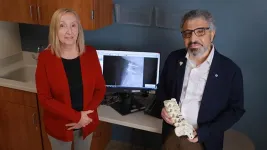(Press-News.org) A new study from orthopaedic researchers at The University of Toledo has found lumbar spinal fusion procedures are far more likely to fail in individuals with diabetes.
“We’ve known for a long time that diabetic patients are at high risk of infection from any surgery, including spinal fusion,” said Dr. Hossein Elgafy, a professor of orthopaedics in the College of Medicine and Life Sciences and chief of spine surgery at UTMC. “More recently, however, physicians have taken a closer look at the high rate of failure in those patients. A lot of times the bones simply aren’t fusing.”
The reason for that, UToledo researchers say, appears to be connected to how diabetes affects bone growth and healing.
In a spinal fusion procedure, surgeons use a combination of screws, rods and bone grafts to join two or more vertebrae together. As the area heals the bones should fuse solidly together, restricting motion and relieving pain.
Sometimes, however, the bones don’t properly heal together. Surgeons call that a non-union complication, and it often leads to more pain and the need for additional, corrective surgery.
While a risk for everyone, individuals with diabetes are particularly susceptible.
In a study of more than 500 patients who underwent lumbar spinal fusion surgery at The University of Toledo Medical Center between 2009 and 2017, researchers found individuals with diabetes were nearly three times more likely than those without diabetes to experience non-union complications.
Diabetic patients also were more than two times more likely to experience additional degeneration in adjacent segments of the spine after a spinal fusion procedure — another complication that usually requires extensive revision surgery.
“Diabetes is a metabolic disease, but it’s also a bone disease,” said Dr. Beata Lecka-Czernik, a diabetes researcher and professor in the Department of Orthopaedic Surgery and the study’s corresponding author. “It has a very significant role in bone health, and that’s what we’re seeing here.”
In addition to reviewing patient data, researchers also analyzed tissue collected from both diabetic and non-diabetic patients who underwent revision surgeries. Those samples, which contained a mixture of connective tissue and developing bone, provided a unique insight into how the healing process in the two groups differed following spinal fusion surgery.
“The bony samples from diabetic patients had much less developed structure, which means that even if the new bone formation happens, the quality of this new bone will be much worse,” Lecka-Czernik said. “This is showing there is also an additional risk factor for spinal fusion complications, which is valuable for orthopaedic surgeons to know when treating patients with diabetes.”
The results of the study were published in the peer-reviewed journal JBMR Plus and were recently presented at the Lumbar Spine Research Society’s annual meeting in Chicago.
Spinal fusion is generally a last-resort treatment after physical therapy and pain management strategies have failed to bring relief. Even so, it’s a common surgery with hundreds of thousands of procedures performed every year in the United States.
Diabetes is an independent risk factor for lower back disc degeneration — one of the most common reasons for spinal fusion surgery. With the rate of diabetes increasing in the United States, the number of spinal fusion procedures is likely to continue climbing as well.
That makes it all the more important to identify and overcome the challenges unique to that patient population, Elgafy said.
“We’ve spent 20 years improving our techniques, our hardware and our technology,” he said. “Now the new wave in spine surgery is bone health. How do we improve bone health before we take people into surgery? It’s an important question as we look to improve surgical outcomes and avoid patients having a second or third surgery. This study is an important first step.”
Elgafy said surgeons do have some tools at their disposal to reduce the risk of failure in diabetic patients, such as ensuring A1C and blood glucose are well-controlled prior to and after the procedure, and exploring biological scaffolds and other therapeutic agents to support new bone formation at the surgical site.
END
Diabetes increases the risk of failure in spinal fusion procedures
Study finds individuals with diabetes are nearly three times more likely than those without diabetes to experience non-union complications following spinal fusion surgery
2024-07-09
ELSE PRESS RELEASES FROM THIS DATE:
Brain-computer interface therapy for stroke survivors
2024-07-09
A personalized brain-computer interface therapy, RehabSwift, significantly enhances hand mobility for stroke survivors. Strokes often lead to impaired hand function, presenting substantial challenges in daily activities. Sam Darvishi and colleagues developed and tested a brain-computer interface therapy that translates imagined hand movements into real actions using a personalized algorithm and bionic hands. The study involved twelve chronic stroke survivors from South Australia who had limited use of their arms but retained clear thinking abilities. Throughout 18 sessions, participants used the RehabSwift system, which included a special cap that ...
SynGAP Research Fund (SRF) increases support for SYNGAP1 organoid research at the University of Southern California’s Quadrato Lab
2024-07-09
MILL VALLEY, Calif. – July 9, 2024 – SynGAP Research Fund (SRF), a 501(c)(3) public charity whose mission is to improve the quality of life for patients suffering from SYNGAP1-Related Disorders (SRD) through the research and development of treatments, therapies, and support systems, has awarded a $130,000 grant to the University of Southern California’s Quadrato Lab to inspect and stratify the effects of specific SYNGAP1 variants on their patient-derived neuronal model system, furthering the world’s understanding ...
Study finds 1 in 12 patients labeled as having ‘benign’ results actually had high-risk prostate cancer
2024-07-09
New research highlights the challenge of balancing the risks of overdiagnosing and underdiagnosing prostate cancer early enough to intervene and minimize risk of death. Recently, some experts have called for the lowest grade of prostate cancer—biopsy Gleason Grade Group (GGG) 1—to be reclassified as ‘benign.’ But a new study led by a researcher from Mass General Brigham has found that many patients with a biopsy GGG1 may have a more aggressive cancer than their biopsy alone suggests.
By looking at data from more than 10,000 patients at a university in Germany, researchers found that at least 8 percent of patients with this ...
Marcos Vilela wins Lilly Research Award for Doctoral Students
2024-07-09
The Royal Spanish Society of Chemistry (RSEQ) and Lilly have announced the winning theses of the 22nd Research Awards for Doctoral Students, which acknowledge outstanding work in the fields of Organic, Pharmaceutical, and Analytical Chemistry. Marcos Vilela, currently pursuing his PhD at the Center for Research in Biological Chemistry and Molecular Materials (CiQUS) at the University of Santiago de Compostela (USC), was awarded alongside Andrea Palone from the University of Girona (UdG) and the University of Rome "Tor Vergata," and Beatriz Arévalo from the Complutense University of Madrid (UCM).
Marcos' thesis, supervised by CiQUS Principal ...
Trust, more than knowledge, critical for acceptance of fully autonomous vehicles
2024-07-09
PULLMAN, Wash. – While not yet on the market, fully autonomous vehicles are promoted as a way to make road travel dramatically safer, but a recent study found that knowing more about them did not improve people’s perception of their risk. They needed to have more trust in them too.
This study adds to the evidence from other research that knowledge alone is not enough to sway people’s attitudes toward complex technology and science, such as gene editing or climate change. In this case, Washington State University researchers found that trust in the autonomous vehicles’ reliability and performance played the strongest role in improving ...
Run screaming or slow retreat? New study advances understanding of brain responses to emotionally-charged scenes
2024-07-09
The ability to recognise and respond to emotionally-charged situations is essential to a species’ evolutionary success. A new study published today [July 9th] in Nature Communications advances our understanding of how the brain responds to emotionally charged objects and scenes.
The research, led by Trinity College Dublin neuroscientist Prof. Sonia Bishop and Google researcher Samy Abdel-Ghaffar while he was a PhD student in Prof. Bishop's lab at UC Berkeley, has identified how the brain represents different categories of emotional stimuli in a way that allows for ...
Brain neurotransmitter receptor antagonist found to prevent opioid addiction in mice
2024-07-09
New research led by UCLA Health has found a drug that treats insomnia works to prevent the addictive effects of the morphine opioids in mice while still providing effective pain relief.
The study, published in the journal Nature Mental Health, concluded that suvorexant, which blocks brain receptors for a neurotransmitter called hypocretin, prevents opioid addiction. At high doses in humans, suvorexant induces sleep and is used to treat insomnia. But sleep was not induced, and behavioral alertness was maintained, at the much lower doses effective in preventing ...
Nerve damage from breast cancer treatment can be predicted
2024-07-09
Many women treated for breast cancer using taxanes, a type of cytostatic drug, often experience side effects in the nervous system. Researchers at Linköping University have developed a tool that can predict the risk level for each individual. The tool could help doctors adapt treatment to avoid persistent side effects in those at the greatest risk.
More and more people are becoming cancer survivors. But even if they have survived the disease, an increasing number still suffer from the side effects of cancer treatment. In a recent study from Linköping University, researchers studied the side effects of taxanes, ...
Water stored under artificial turf could make cities cooler and safer to play in
2024-07-09
For those living in cities, space to play sports outside can be a scarcity. Recently, natural grass in parks or public sports courts has often been replaced with more durable artificial turf to allow heavy consecutive use.
There are, however, downsides to this practice, both for people and for cities as a whole. Now, scientists in the Netherlands have set out to change that by integrating a subsurface water storage and capillary irrigation system under artificial turf sports fields.
“Here we show that including a subsurface water storage and capillary ...
How a plant app helps identify the consequences of climate change
2024-07-09
Plants are known to respond to seasonal changes by budding, leafing, and flowering. As climate change stands to shift these so-called phenological stages in the life cycle of plants, access to data about phenological changes – from many different locations and in different plants – can be used to draw conclusions about the actual effects of climate change. However, conducting such analyses require a large amount of data and data collection of this scale would be unthinkable without the help of citizen scientists. “The problem is that the quality of the data suffers when fewer people engage ...
LAST 30 PRESS RELEASES:
How stepping into nature affects the brain
Study: Cancer’s clues in the bloodstream reveal the role androgen receptor alterations play in metastatic prostate cancer
FAU Harbor Branch awarded $900,000 for Gulf of America sea-level research
Terminal ileum intubation and biopsy in routine colonoscopy practice
Researchers find important clue to healthy heartbeats
Characteristic genomic and clinicopathologic landscape of DNA polymerase epsilon mutant colorectal adenocarcinomas
Start school later, sleep longer, learn better
Many nations underestimate greenhouse emissions from wastewater systems, but the lapse is fixable
The Lancet: New weight loss pill leads to greater blood sugar control and weight loss for people with diabetes than current oral GLP-1, phase 3 trial finds
Pediatric investigation study highlights two-way association between teen fitness and confidence
Researchers develop cognitive tool kit enabling early Alzheimer's detection in Mandarin Chinese
New book captures hidden toll of immigration enforcement on families
New record: Laser cuts bone deeper than before
Heart attack deaths rose between 2011 and 2022 among adults younger than age 55
Will melting glaciers slow climate change? A prevailing theory is on shaky ground
New treatment may dramatically improve survival for those with deadly brain cancer
Here we grow: chondrocytes’ behavior reveals novel targets for bone growth disorders
Leaping puddles create new rules for water physics
Scientists identify key protein that stops malaria parasite growth
Wildfire smoke linked to rise in violent assaults, new 11-year study finds
New technology could use sunlight to break down ‘forever chemicals’
Green hydrogen without forever chemicals and iridium
Billion-DKK grant for research in green transformation of the built environment
For solar power to truly provide affordable energy access, we need to deploy it better
Middle-aged men are most vulnerable to faster aging due to ‘forever chemicals’
Starving cancer: Nutrient deprivation effects on synovial sarcoma
Speaking from the heart: Study identifies key concerns of parenting with an early-onset cardiovascular condition
From the Late Bronze Age to today - Old Irish Goat carries 3,000 years of Irish history
Emerging class of antibiotics to tackle global tuberculosis crisis
Researchers create distortion-resistant energy materials to improve lithium-ion batteries
[Press-News.org] Diabetes increases the risk of failure in spinal fusion proceduresStudy finds individuals with diabetes are nearly three times more likely than those without diabetes to experience non-union complications following spinal fusion surgery








